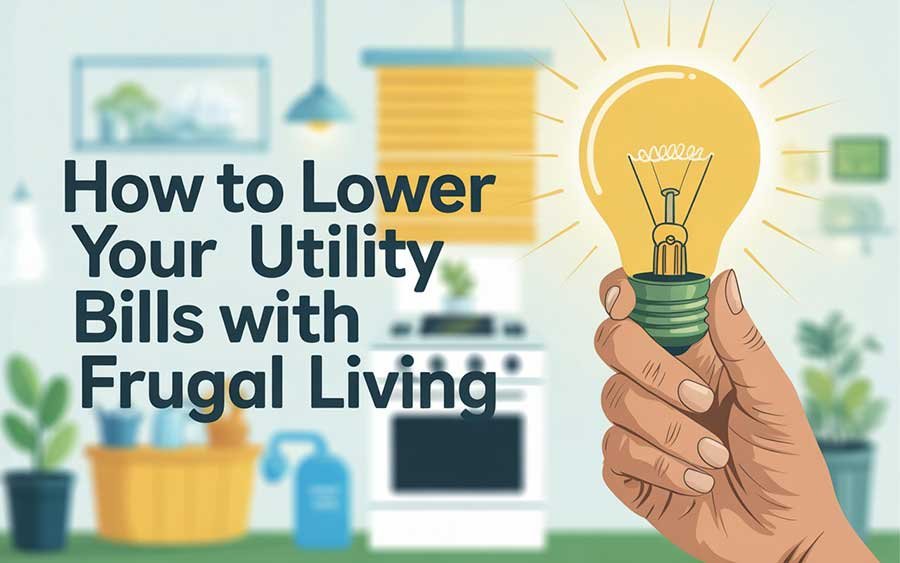
The Invisible Drain: How to Lower Your Utility Bills With Frugal Living
That monthly utility bill. It arrives, predictable as the sunrise, and often delivers a jolt of dread. Heating, cooling, electricity, water – these essential services can quietly consume a significant chunk of your hard-earned money, sometimes feeling like an uncontrollable, ever-increasing expense. You might already be clipping coupons and meal planning (which is fantastic!), but still find your energy and water consumption stubbornly high, leaving less money for savings, debt repayment, or even a little fun.

What if I told you that you don’t need expensive smart home upgrades or drastic lifestyle changes to see a real difference? What if a significant portion of your utility bill is simply a result of unconscious habits and overlooked efficiencies that can be transformed with a little frugal living wisdom? It’s not about living in the dark or taking ice-cold showers; it’s about making smart, conscious choices that conserve resources and put more money back into your pocket, instantly.
This isn’t just another checklist of generic tips. This is your definitive, deep-dive guide into how to lower your utility bills with frugal living. We’re talking practical strategies, often overlooked hacks, real-life examples of how people have slashed their monthly expenses, and the kind of inspiring insights that will empower you to take control of those persistent household costs. Get ready to turn wasteful habits into powerful savings.
The Cost of Convenience: Why Utility Bills Creep Up (and How Frugality Fights Back)
Before we dive into the specific tactics, let’s understand why utility bills can feel so uncontrollable and how a frugal mindset directly combats this.
Imagine your home as a leaky bucket. Every time you turn on a light in an empty room, leave a device plugged in, or take an extra-long hot shower, it’s like a small stream flowing out of that bucket. These individual streams might seem insignificant, but over a month, they add up to a gushing river of wasted money and energy.
Utility bills creep up due to:
- Phantom Load/Vampire Drain: Electronics drawing power even when turned off or in standby mode.
- Thermal Leaks: Poor insulation, drafty windows, and unsealed gaps letting precious heated or cooled air escape.
- Water Waste: Long showers, leaky faucets, inefficient appliances.
- Unconscious Habits: Leaving lights on, over-cooling/over-heating, running partial laundry loads.
- Outdated Appliances: Older models are significantly less energy and water efficient.
Frugal living isn’t about being cheap; it’s about being resourceful and intentional. It’s about recognizing the value of every resource – energy, water, and ultimately, your money. By adopting a frugal mindset towards utilities, you’re actively plugging those leaks, making conscious choices that directly translate into lower bills and a healthier planet.
Your Frugal Utility Saving Blueprint: Actionable Strategies for Every Corner of Your Home
Here’s a step-by-step approach to identifying and tackling high utility costs, corner by corner.
Pillar 1: Thermostat Taming – Master Your HVAC
Heating and cooling are often the biggest culprits on your energy bill, accounting for nearly half of a typical home’s energy use. Small adjustments here can lead to massive savings.
- The Shift: Instead of reacting to temperature, proactively manage it.
- The Practice:
- Set It and Forget It (Mostly): Aim for 68°F (20°C) in winter and 78°F (26°C) in summer when you’re home. Adjust by 7-10 degrees when you’re sleeping or away for more than a few hours.
- Programmable/Smart Thermostat: Invest in one. They pay for themselves quickly by automating temperature adjustments based on your schedule. You don’t need the most expensive smart ones; a basic programmable one from a home improvement store does wonders.
- Strategic Use of Fans: Ceiling fans (clockwise in winter to push warm air down, counter-clockwise in summer to create a breeze) can make you feel 2-4 degrees cooler/warmer, allowing you to adjust your thermostat accordingly.
- Layer Up/Down: In winter, wear a sweater or use a blanket. In summer, wear light clothing. Don’t immediately reach for the thermostat.
- Why this matters: These habits ensure you’re not paying to heat or cool an empty house, or to maintain a temperature much different from what’s truly comfortable with minor adjustments.
- Real-Life Example: The Chen Family’s Smart Thermostat Win The Chen family, living in a climate with hot summers and cold winters, found their HVAC bills astronomical. “We used to keep our thermostat at 72°F (22°C) year-round,” Mr. Chen shared. “We installed a basic programmable thermostat and set it to 65°F (18°C) in winter when we were at work and sleeping, and 80°F (27°C) in summer. That simple automation, combined with wearing layers, cut our combined heating/cooling bill by about 15-20% each month. It was an instant, noticeable saving.”
Pillar 2: Phantom Power Patrol – Unplugging the “Vampires”
Many electronics consume electricity even when turned off, simply by being plugged in. This “phantom load” or “vampire drain” can account for 5-10% of your electricity bill.
- The Shift: Instead of passive power drain, engage in active power management.
- The Practice:
- Unplug When Not in Use: Unplug phone chargers, coffee makers, toasters, TVs, gaming consoles, and computers when you’re not actively using them.
- Smart Power Strips: Invest in smart power strips that automatically cut power to devices when they’re turned off or idle. Plug your entertainment system (TV, console, sound system) into one.
- Monitor Energy Hogs: Use an electricity usage monitor (often available to rent from your utility company or buy cheaply) to identify which appliances are the biggest offenders.
- Why this matters: This is “free money” waiting to be saved. It requires consistent habit but has zero impact on your comfort or lifestyle.
- Real-Life Example: Jessica’s Device Discipline Jessica, a student living in an apartment, realized her multiple phone chargers, laptop, and gaming console were always plugged in. “I got a smart power strip for my gaming setup and made it a habit to unplug my phone charger when not in use,” she said. “My electricity bill dropped by almost $15-$20 a month. It wasn’t huge, but it was money I literally didn’t have to earn.” For more ways to identify and cut unnecessary spending, check out our article on A Self Help Hub: 15 Things to Stop Buying to Save Money Instantly.
Pillar 3: Water Wisdom – Conserving the Liquid Gold
Water bills often include both water usage and sewer charges, so every gallon saved is a double win.
- The Shift: Instead of unconscious water flow, cultivate mindful water use.
- The Practice:
- Shorter Showers: Aim for 5-7 minute showers. Turn off the water while lathering up or shampooing.
- Low-Flow Fixtures: Install low-flow showerheads and faucet aerators. These are inexpensive and can significantly reduce water consumption without sacrificing pressure.
- Fix Leaks: A dripping faucet can waste thousands of gallons a year. A running toilet can be even worse. Fix leaks immediately.
- Full Loads: Only run your dishwasher or washing machine when they are full. Use the “eco” or “cold water” setting for laundry (90% of a washing machine’s energy goes to heating water!).
- Don’t Let the Tap Run: Turn off the water while brushing your teeth, shaving, or scrubbing dishes.
- Collect Rainwater: If possible, use rain barrels for watering plants or non-potable outdoor uses.
- Why this matters: Water conservation not only saves on your water bill but also reduces the energy used to heat water, leading to double savings.
- Real-Life Example: Ben’s Shower Challenge Ben loved long, hot showers. His water bill was consistently high. He challenged himself to take 5-minute showers, using a timer. “It was tough at first, but I got used to it,” he shared. “Then, I started turning off the water while lathering. My water bill, plus the energy bill for heating the water, dropped by about $40 a month. It’s a small change that made a big difference, and it actually helped me be more mindful about other resources too.”
Pillar 4: Light & Appliance Literacy – Smart Usage, Not Sacrifice
Lighting and appliance usage contribute significantly to your electricity bill. Frugal adjustments here can be highly effective.
- The Shift: Instead of passive illumination and appliance use, actively manage their consumption.
- The Practice:
- Switch to LEDs: Replace old incandescent bulbs with LED lights. They use 75-90% less energy and last much longer. While more expensive upfront, they pay for themselves quickly.
- Turn Off Lights: Simple but effective. Turn off lights when leaving a room for more than a few minutes, or when natural light is sufficient.
- Maximize Natural Light: Open blinds and curtains during the day. Arrange furniture to benefit from natural light.
- Use Smaller Appliances: For cooking, use a microwave, toaster oven, or slow cooker instead of a full-size oven whenever possible. They use significantly less energy.
- Clean Appliance Coils/Filters: Regularly vacuum refrigerator coils (usually at the back or bottom), clean dryer lint traps (before every load), and clean/replace HVAC filters monthly. Dirty components make appliances work harder and use more energy.
- Refrigerator Habits: Keep your fridge and freezer full (they run more efficiently), and don’t put hot food directly into the fridge. Minimize how long the door stays open.
- Why this matters: These actions reduce energy consumption directly at the source, without requiring you to live in the dark or give up conveniences.
Pillar 5: Home Envelope Optimisation – Plugging the Leaks
Your home’s “envelope” (walls, windows, doors, roof) is crucial for maintaining temperature. Leaks here are like open windows, constantly letting money escape.
- The Shift: Instead of passively losing energy, actively seal your home.
- The Practice:
- Seal Air Leaks: Use caulk to seal cracks around windows, doors, and electrical outlets. Use weatherstripping for doors and movable window sashes. Even small gaps add up.
- Window Treatments: Use heavy curtains or blinds, especially on sunny windows in summer to block heat, or on all windows in winter to add an insulating layer. Keep them open in winter on sunny days to let in natural heat.
- Insulation Check: If you have an older home, consider having your attic and wall insulation checked. Proper insulation is a significant long-term energy saver.
- Draft Stoppers: Use draft stoppers under doors leading to unheated areas or outside.
- Why this matters: Preventing air leakage ensures your heating and cooling systems aren’t constantly fighting against the outside elements, leading to significant, sustained savings.
Real-Life Transformations: Frugal Habits, Lower Bills
These stories from everyday people demonstrate the real-world impact of adopting frugal utility habits.
- Liam’s “Energy Detective” Journey: Liam, a new homeowner with unexpectedly high utility bills, decided to become an “energy detective.” He bought an inexpensive energy monitor to find phantom loads, sealed all his windows with caulk and weatherstripping, and swapped all his incandescent bulbs for LEDs. “The first month, my electricity bill dropped by $45, and my gas bill by $30,” Liam exclaims. “I was shocked! It was mostly just turning off power strips and sealing drafts. The initial small investment in caulk and LEDs paid for itself almost immediately. Now, I actually enjoy the ‘hunt’ for more savings!”
- Sarah’s Laundry Revolution: Sarah had a family of five and endless laundry. She switched to washing almost all loads in cold water and always cleaned the lint trap. “I heard that heating water was the biggest energy drain for laundry,” Sarah shared. “The detergents today work just fine in cold water. And regularly cleaning the lint trap made our dryer more efficient. Our electricity bill went down by about $30 a month just from those two changes. It sounds small, but over a year, that’s $360 that stays in our budget!”
- The Rodriguez Family’s Water Conservation Wins: The Rodriguez family faced rising water bills. They fixed a leaky toilet (which was constantly running), installed low-flow showerheads, and started turning off the tap while brushing teeth. “The toilet leak was costing us a fortune without us even realizing,” Mr. Rodriguez recounts. “But the daily habits like shorter showers and turning off the tap really added up. Our water bill dropped by a consistent $25-$30. It taught our kids valuable lessons about conserving resources, too, which is a bonus.”
These stories illustrate that being frugal with utilities isn’t about discomfort; it’s about making conscious choices that align with your financial goals and a more sustainable lifestyle.
Picture This…
Imagine opening your utility bill not with a sigh of resignation, but with a smile of satisfaction. You see the numbers steadily decreasing, a direct result of your conscious habits and smart choices. Your home feels comfortable, your lights are bright, and your appliances work efficiently, but you know you’re not paying for waste. That extra money in your bank account, once drained by unnoticed leaks, is now free to go towards your savings goals, debt repayment, or even a well-deserved treat. You feel empowered, resourceful, and proud of the positive impact you’re making on your wallet and the planet. This isn’t just a fantasy; it’s the abundant reality waiting for you when you master the art of lowering your utility bills with frugal living.
20 Quotes to Fuel Your Utility-Saving Journey
- “A dollar saved is a dollar earned.” – Benjamin Franklin (especially true for utilities!)
- “Every day we are paying more for energy than we should due to poor insulation, inefficient lights, appliances, and heating and cooling equipment.” – Bernie Sanders
- “Frugality is founded on the most certain and unchangeable rules of honor.” – Samuel Johnson
- “Waste not, want not.” – Proverb
- “Energy efficiency not only saves businesses and consumers money, but it also reduces pollution by cutting energy use.” – Jeff Van Drew
- “The first wealth is health.” – Ralph Waldo Emerson (less financial stress, better health)
- “Small daily improvements are the key to long-term results.” – Unknown
- “Live simply, so that others may simply live.” – Elizabeth Ann Seton (frugality has a ripple effect)
- “The less you want, the richer you are.” – Unknown
- “A home with well-sealed air leaks is like a warm blanket in winter and a cool breeze in summer.” – Unknown
- “He who buys what he does not need, steals from himself.” – Swedish Proverb
- “You can’t save your way to millions, but you can certainly spend your way to broke.” – Unknown
- “Every drop of water saved is a drop of life conserved.” – Unknown
- “The greatest wealth is to live content with little.” – Plato
- “Frugal living is not about giving up everything; it’s about making mindful decisions.” – Unknown
- “Energy conservation is the foundation of energy independence.” – Tom Allen
- “The smartest thing to do is make your house as efficient as possible before you start putting solar panels on it.” – Unknown
- “Don’t just count your money, make your money count.” – Unknown
- “The choice to live a frugal life is not a life of suffering. It is a life of intention.” – Joshua Becker
- “True wealth is not about having a lot of money; it’s about having a lot of peace of mind.” – Unknown (which lower bills contribute to!)
Disclaimer
This article is intended for informational purposes only and is based on general frugal living principles, energy conservation tips, and common household efficiency practices. Individual results may vary significantly depending on your location, climate, home’s age, appliance efficiency, and personal habits. While these strategies can lead to substantial savings, they may not apply to every situation. It is always recommended to assess your own specific circumstances and consider consulting with a qualified energy auditor or financial advisor for personalized guidance. This content should not be considered a substitute for professional advice.
Share This Article!
Ready to turn down those high utility bills? Share this comprehensive guide with a friend, family member, or on your social media to help others save money and energy!






